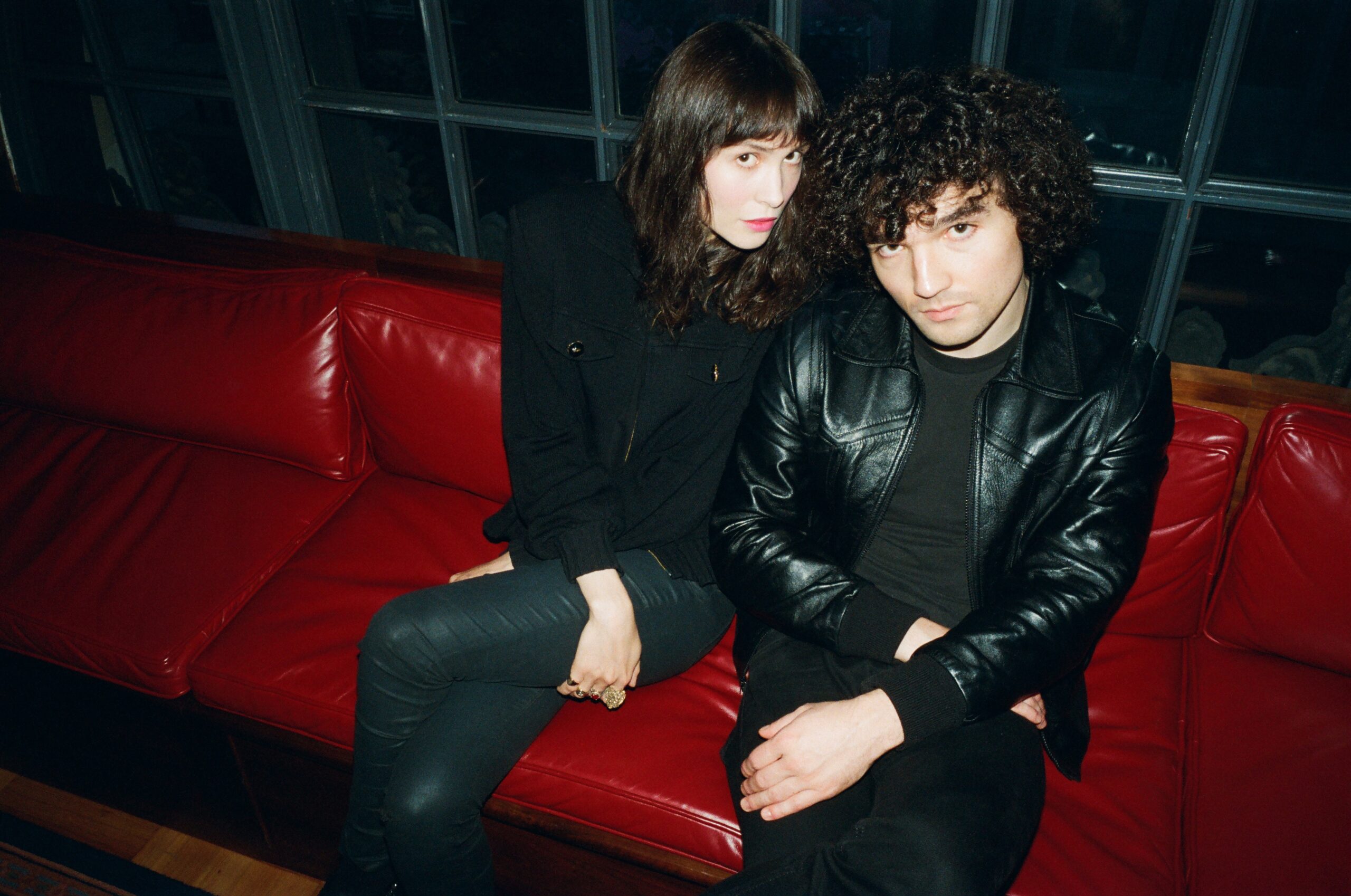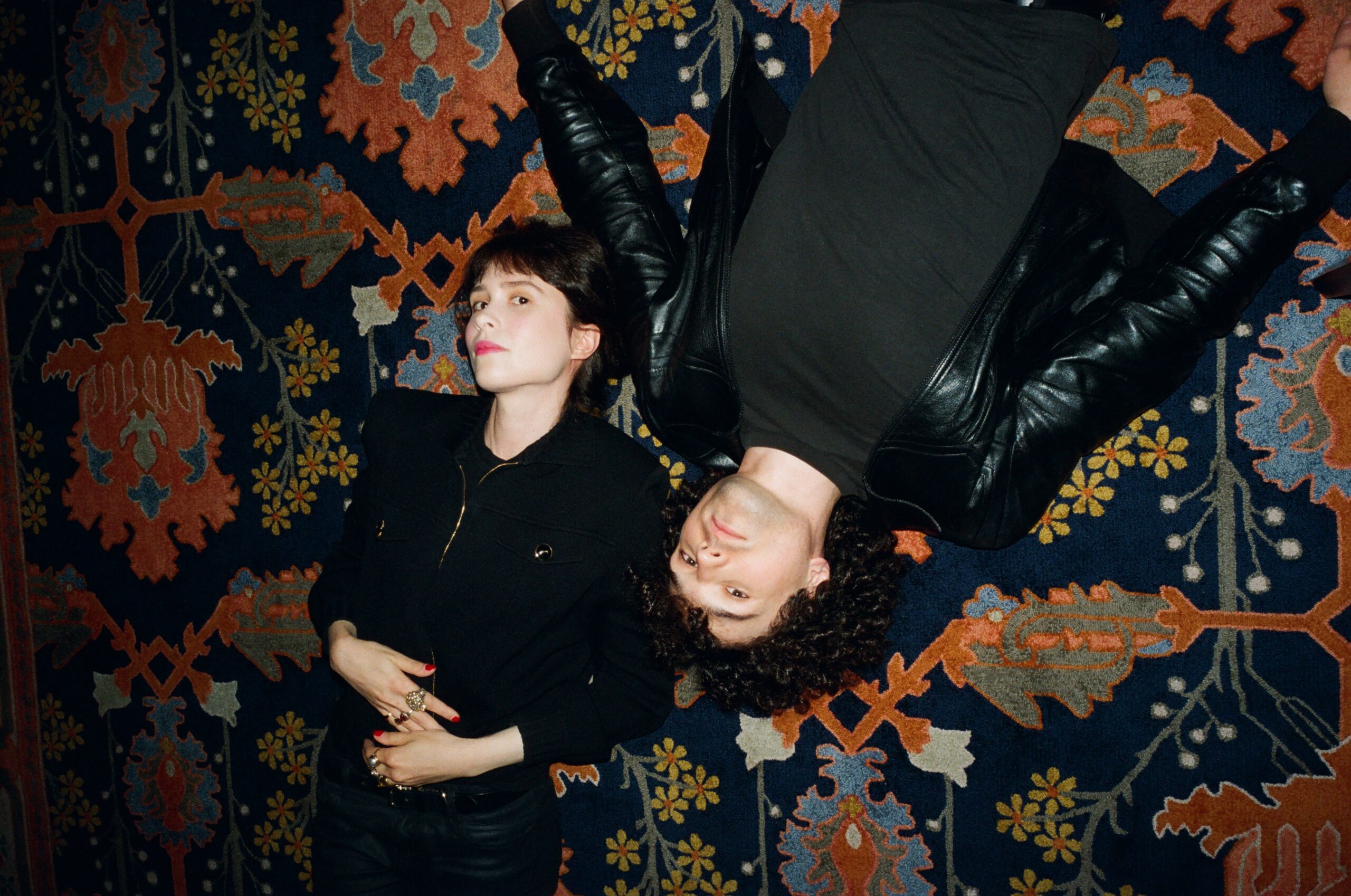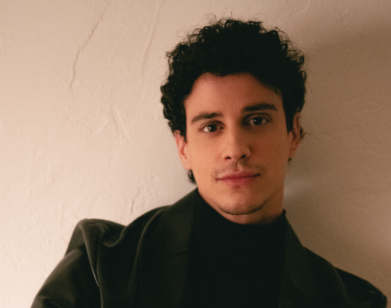film
The Directors at Simone Films Have Michael Imperioli’s Attention
Rebekah Sherman-Myntti and KJ Rothweiler are returning to innocence. Over a decade after forming their production company, Simone Films, as college freshmen, they’re hearkening back to the fragile, open-hearted days of youth in a splashy debut feature film. Salamander Days is, nominally, a work of coming-of-age cinema, confronting the vulnerabilities of life in the last breath of childhood, but it goes farther than most to place the viewer right back in the high school classroom. “It was like writing a letter to our younger selves,” Sherman-Myntti says of the process. Production is just one flank of Simone Films’ mission; Sherman-Myntti and Rothweiler offer a free NYC-based acting class called Simone Actors Studio, taught by no less than Michael Imperioli. After sold-out screenings on both coasts, the White Lotus and Sopranos star called up the first-time filmmakers to talk about information overload, the internal worlds of teenagers, and what comes next in their “loss of innocence” trilogy.
———
KJ ROTHWEILER: Hello, Michael.
MICHAEL IMPERIOLI: Hello again.
REBEKAH SHERMAN-MYNTTI: Nice to see you.
IMPERIOLI: Well, do you want to start with an overview of the film, Salamander Days?
SHERMAN-MYNTTI: You start.
ROTHWEILER: Salamander Days is a movie about being an adolescent in high school, dealing with emotions and life happenings that are larger than you might be prepared to handle. It’s about how your mind interprets events when you’re growing and changing as a teenager.
SHERMAN-MYNTTI: Yeah. I think it’s about adolescent consciousness and the internal world of teenagers when they are first grappling with these large experiences. So loss and grief and death and friendship and love are all part of the movie.
IMPERIOLI: Why did you feel it was important to express these ideas?
SHERMAN-MYNTTI: Never before had KJ and I seen a movie that really shows the internal emotional landscape of kids at that age. We were kids who experienced loss and experienced friends dying, so creating a movie that delves into those emotions was really personal. KJ, how would you answer that?
ROTHWEILER: Coming-of-age is a genre that we’re both really drawn to, but there’s probably fewer films than we can count on two hands that actually replicate the feeling of being that age. I think the cinema of being a teenager is so emotionally loaded, but a lot of times they’re reductive, and we wanted to give it the weight that it really had for us when we were younger.
IMPERIOLI: Yeah, it was a very subjective way of telling the story about these kids, in my opinion, which is unique to coming-of-age movies. And you were able to achieve that through the style of the writing, the music, the cinematography. I’m just going to ask personal questions. Are there any experiences that you had where you can draw a straight line from that moment to Salamander Days?
ROTHWEILER: Absolutely.
SHERMAN-MYNTTI: Yes.
ROTHWEILER: There was an experience that I had where I was briefly dismissed from my high school because I happened to be around when my friend decided to singe a hole in a sock that started a fire at my school. And because I was there, I was implicated. That’s just a detail that happens in the movie. I think something that Rebekah and I are both more connected to is the loss of a friend, which Rebekah could probably speak to.
SHERMAN-MYNTTI: Yeah. When I was 15, a friend of mine went missing and died very suddenly. The questions that you’re left with about something like that, and also just about life and death, make you confront certain subjects for the first time in a very intense and profound way. And those questions about mortality will be ones I try to answer through my work for the rest of my life. This movie is KJ’s and my first movie, and I think that it’s almost like a letter to our teenage selves. When we went into the writing and eventual making of this movie, we were what, 25? It was like writing a letter to our younger selves and answering questions that maybe we wished we could at those ages.
IMPERIOLI: Coming-of-age has always been a very resonant theme for me as a reader and movie-goer, and as a writer as well. I did a talk last week at a bookstore in the East Village about a coming-of-age novel I wrote, and someone asked, “What are the qualities of that age—the protagonist in the book is 16—that you wanted to express?” And I said that it was the feeling of inadequacy that a lot of adolescents have. They’re not enough. What they do is not enough. I’m not even only talking about kids who are outcasts. Even kids with healthy friendships. I’m wondering if you can relate to that or if there’s a parallel in your film.
ROTHWEILER: Yeah. There’s a real fragility and insecurity to the worldview of a young person. We’re a bit older now. I turned 33 yesterday and someone asked me how I felt about it. I was thinking about our movie, and I was like, “I feel a lot better than I used to.” I think the membrane of my sense of self has hardened and it’s not as malleable and vulnerable as it used to be.
SHERMAN-MYNTTI: Yeah, I completely agree. You’re just absorbing everything at that age, and at the root of all of it is, like you said, that vulnerability. Not to switch it on you, but what were you like at that age, Michael?
IMPERIOLI: I had friends, I played sports, but I always had the feeling that I was biding my time until life started. It felt like I was in a waiting room, even though there were fun times. It was like I couldn’t wait to get done with this to start my life. I think it’s one reason why I didn’t wind up going to college. Once I started taking acting classes when I was 17, I went from being with kids my own age to all of a sudden being in class with people who were in their thirties and forties, and I really liked that. I felt I was in the real world. But that sense of inadequacy was all-pervasive. I had an English teacher that made us read short stories, but she wanted us to bring them to life a little bit, like a performance. So I did The Tell-Tale Heart, which is a really good one to perform, and she said, “You should try acting or join the drama club.” The last thing I wanted to do was be on stage in high school. It felt like being exposed in a way that I couldn’t handle. At one of the early screenings of your film in New York, you mentioned that this was the first of a “loss of innocence trilogy” that you’re planning to do. And I wanted to ask, is it possible to find innocence after it’s been lost?
ROTHWEILER: I think the lifelong quest is to somehow try and get back to that state. I mean, I’m glad that you mentioned the waiting room element of adolescence because Salamander Days feels like the most naive and innocent. People have said, “This high school is so idyllic, it’s almost like a vision of heaven.” But I feel like it’s what the title evokes, which is this limbo when your life hasn’t begun yet and you don’t feel like a real person yet. We wanted to start exploring this time period from its most liminal, and we plan to make successive films that go further and further into—not corruption, but away from innocence and into adulthood. But to your question of regaining innocence, I don’t think you ever can, but you can attempt to go back to a childlike state.
IMPERIOLI: What does the childlike state mean to you?
ROTHWEILER: Just a sense of wonder and curiosity, which we’ve always found with you. When you teach the acting class and engage with anything, there’s a purity to it that is easy to lose when you become an adult. It’s easy to become jaded and hardened by life.
SHERMAN-MYNTTI: It’s rare to be in the presence of someone who provides you with that feeling of purity.
IMPERIOLI: Purity is a stretch…
SHERMAN-MYNTTI: No, but it is. If we’re talking about the acting class, for example, the way that you lock in and engage with people from a deep and thoughtful place is greatly appreciated by everyone who experiences it. What do you think is the connection between innocence and consciousness? Awareness of the world and the things that go on in it, and of the events of your own life. I think that that relationship is really interesting.
IMPERIOLI: The only thing you can really be aware of is your own mind. Even if you’re aware of someone else’s suffering, you’re connecting it through your mind. So the more you’re able to have that awareness of what your mind is actually doing, the better, rather than just getting lost in the attachment to whatever you’re perceiving. When you’re engaged in something very pleasurable, you’re consumed by the sensorial qualities of it that are so compelling and addicting. Or the opposite, when you’re engaged in something that’s very repulsive, dangerous, or sad, you’re not aware of your mind because you’re so locked into the experience. Even teaching an acting class. You can have a strong attachment to ego. “I’m an accomplished actor. I have all this wisdom to impart. I want to be sagacious. I want these people to admire me. I want them to think I’m spiritual.” That’s a whole other trip, spiritual materialism. Spirituality and being on a path, especially an exotic one, like Tibetan Buddhism, can enhance the ego. So the ages of the kids in the movie are supposed to be 16 or 17?
ROTHWEILER: Around that, yeah.
IMPERIOLI: That was you 17 years ago. What are the challenges you think are unique to this adolescent generation?
SHERMAN-MYNTTI: I mean, the obvious thing is that when KJ and I were in high school, the culture of comparison wasn’t as accessible to us. I see teenagers today really, really struggling with social media and how they choose to portray themselves online. The decision-making is just so crushing and anxiety-inducing because they constantly compare themselves to others through online profiles. When we were in high school, people didn’t even have iPhones. We were really the last group of kids that got away with being in school without having screens in our daily lives. I think we were really lucky because being able to sit with yourself and engage with your thoughts and friendships in real life is a totally different experience.
ROTHWEILER: Yeah, and that was why it was a conscious decision to not have phones in the film. When we were teenagers, a lot of those things were maybe still at play, but they were all happening in the physical space of a high school. Maybe you’d be comparing yourself to another kid in the classroom, but there wasn’t the backdrop of the larger world and everyone in it. We dealt with the same things to some degree, but not with the severity that they do now. I mean, it’s something we even deal with as adults. I deleted Instagram yesterday just because I wanted to enjoy my birthday. It really is difficult to engage with the larger world every day. It can affect you in a deeply personal way. And with Salamander Days, we wanted to explore all of these ideas, but in the real world, how it was for us then. I think I would have a very difficult time being a teenager right now.
IMPERIOLI: Both for teenagers and everyone else, the amount of information that we receive on a daily basis is exponentially more than it was. I mean, forget when I was a teenager. I was 16 in 1982. But I’m not only talking about stuff that’s really provocative or inflammatory, even just the benign stuff. The brain is processing it to some degree, digesting it somehow. And the speed of it, wow. It’s really come to light in the last few weeks with all the information and connection to what’s happening in the world. And social media and mass media is going further and further. It’s probably still in its infancy.
ROTHWEILER: Absolutely.
SHERMAN-MYNTTI: I think there’s a feeling of anxiety and dread and helplessness in a lot of young people these days that is so rooted in what’s going on in the world, from politics to climate change, that they feel is so out of their control.
IMPERIOLI: Yeah. When I was a kid, you had the Cold War, the threat of nuclear annihilation, which was a big deal, but you weren’t looking at posts about it all day long all the time. The way you received information was very limited. I’ve heard that there’s young people who are moving towards flip phones. Have you heard about this?
SHERMAN-MYNTTI: Yes.
ROTHWEILER: Oh, yeah. I’m considering it.
IMPERIOLI: Young people are saying, “I want to opt out of this constant 24/7 information.”
ROTHWEILER: Well, people go on technology retreats and detoxes now because of the way it affects our mind. Being oversaturated with information all day takes us away from a stiller space where we feel creative and our imaginations run wild. Personally, I feel that my ability to conjure ideas gets killed by taking in information all day. It must, because it’s exhausting on some level.
SHERMAN-MYNTTI: And the change in attention spans is affecting everything. Even in the film industry, the productions that are happening are geared towards changing attention span in viewers. It’s wild.
IMPERIOLI: Have you ever dreamed about scrolling on Instagram? Has that ever happened to you?
ROTHWEILER: Has it happened to you?
IMPERIOLI: Yeah, I woke up and I was fucking horrified. I’m not kidding. It was horrendous.
ROTHWEILER: That’s a real nightmare. I’ve dreamt that I got a DM that I didn’t get and I made up with somebody, but it wasn’t true, which was scary. I read a lot of sci-fi in high school that all seemed far-fetched, and it does not seem far-fetched anymore. The way this stuff is changing our minds is pushing us towards a different kind of humanity, which sounds ridiculous, but I think it’s true.
IMPERIOLI: What would number two in the trilogy be? Will it be a little bit older, like the first year of college or mid-twenties? Or do you not want to reveal that?
SHERMAN-MYNTTI: For my movie, it’s two different timelines happening. One timeline is someone approaching 30 and looking back, and then the other timeline is from young adolescence, like between 8 to 16.
IMPERIOLI: In the same movie?
SHERMAN-MYNTTI: Yeah. And for both of us, the concept of memory and how they flow through those ages is really interesting.
ROTHWEILER: For me, it’s around the age directly after Salamander Days. It’s more like 17 to 18. But if Salamander Days is more naive and internal, this is what happens right after, when things do start happening in reality. There’s more action and innocence gets lost more quickly. It’s a little more visceral.
IMPERIOLI: You’ve done writing and directing, producing other people’s work, some acting, podcasting, and you both offer a free acting class. Are you looking at creating a collective of artists? How do you see the bigger picture of what you’re doing?
SHERMAN-MYNTTI: I think what KJ and I have always gravitated towards with Simone Films is making it an organism that feeds itself. At the end of the day, it’s all about inclusion, right? So we love supporting young up-and-coming actors in the actor’s studio who are then in some of the films that we’re producing. It’s a very community-focused thing. Often we find that in the film industry, when you are an up-and-comer, there isn’t a whole lot of support, and to create a world for that collaboration to exist is a really beautiful thing.
IMPERIOLI: Was there a model or inspiration for what you’re trying to do with Simone Films?
SHERMAN-MYNTTI: Honestly, there’s nothing that we’re trying to replicate. It’s just coming from a place of wanting to treat people the way that we want to be treated. It sounds so basic, but it’s true. It’s been really important to me and KJ since we were teenagers. It breeds good work and good creativity.
IMPERIOLI: You met at Sarah Lawrence, correct?
SHERMAN-MYNTTI: Yes.
IMPERIOLI: Did you study film there?
SHERMAN-MYNTTI: We did, along with a bunch of other things.
ROTHWEILER: We had some amazing professors. We love great teachers, which you can probably tell from the movie.
IMPERIOLI: There were a lot of art teachers in the movie. Good teachers are invaluable, aren’t they? I’m really indebted to several, and I can’t imagine what would’ve happened if they weren’t in my life.
SHERMAN-MYNTTI: Me too.
ROTHWEILER: In a lot of ways, the movie is a love letter to teachers that have inspired us and who we maybe didn’t appreciate as much as we do now. So much of what they said may have flown over our heads, and maybe we should have listened a little closer.
SHERMAN-MYNTTI: It was such a gift that we received such wonderful wisdom from many teachers over the course of our study. A few of the teachers in the movie are my high school teachers who came out of retirement to be in it. Mr. DeSantis, the English teacher and creative writing teacher in the movie, was someone who KJ and I included in a documentary we made in our sophomore year of college about aging and growing old. So he’s been part of our filmmaking work for a long time. It’s cute.
ROTHWEILER: And Michael, you’re one of our favorite teachers.
SHERMAN-MYNTTI: Yes.
IMPERIOLI: I like teaching your class. It’s a lot of fun. You have really good vibes there.
ROTHWEILER: We’re excited for you to come back.
IMPERIOLI: I’ll be back.





